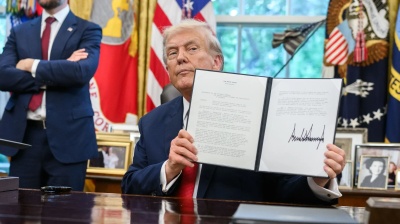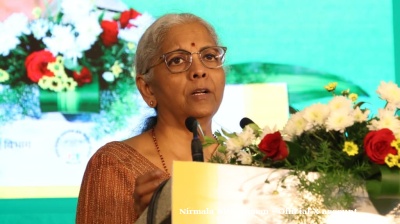Hungarian Prime Minister Viktor Orban will not attend Donald Trump's inauguration on January 20 but will instead deliver a keynote speech at a conference evaluating Hungary's EU presidency on the same day, the PM's press chief Bertalan Havasi told independent Telex.hu on January 16.
For weeks, government communications had touted the event as a significant diplomatic opportunity, making Orban's abrupt reversal particularly noteworthy and surprising.
Orban was the first EU leader to endorse Trump in 2016 openly, and in both of Trump’s campaigns since then, the ruling Fidesz party celebrated his return to the White House with great jubilation.
The prime minister himself called it a "brilliant victory" and "perhaps the biggest comeback and giant struggle in Western political history." Over the past eight years, Fidesz has built both informal and formal connections with the American right. Experts from the state-funded Danube Institute have even contributed to Project 2025, a transition plan developed by the Heritage Foundation that serves as a guideline for Trump’s second administration.
According to the political think-tank Political Capital, Orban believes Trump's presidency could potentially empower populist movements across Europe, widening his diplomatic space to manoeuvre while reducing international scrutiny of Hungary's democratic erosion. Hungary also expects clear economic benefits from the shift in Washington. Orban and his government members have high hopes that bilateral ties will strengthen, with billions of dollars in new investment potentially flowing into Hungary.
The government also expects the renewal of double taxation avoidance agreements with Washington, which lapsed under the previous administration, something the prime minister mentioned in an interview.
Later in the day, Secretary of State for International Communications Zoltan Kovacs clarified that neither Orban nor other Hungarian government representatives had been invited to Trump’s inauguration. Kovacs explained that the event is not a formal gathering for foreign dignitaries, and those attending, such as Italian Prime Minister Giorgia Meloni and Dutch politician Geert Wilders, are doing so by personal invitation.
According to The Hill, President-elect Trump did invite Orban to the ceremony, as confirmed by other US media outlets. At first glance, his decision to skip the ceremony might seem surprising, but there are several reasons why his choice makes political sense, according to Szabolcs Dull, the former editor-in-chief of Index.hu and Telex.hu.
Flying off to Washington right after returning from a two-week holiday in India, which was not officially announced but leaked to the press, would not look good politically, he writes on his blog. Orban would be another face in the crowd, he claims, adding that the prime minister and his staff are working behind the scenes to bring Trump to Budapest, possibly timed during next year's election campaign.
Other analysts suggest the move could be tied to recent US sanctions targeting Viktor Orban's key ally, cabinet chief Antal Rogan, who also oversees communications and intelligence services. The sanctions may legally extend to individuals with business ties to Rogan, they added.
Miklos Radvanyi, the senior VP of think-tank Frontiers of Freedom Institute, has backed up this narrative in a podcast interview with Hungarian media.
The institute, closely aligned with the Republican Party, had previously submitted a detailed report in 2018 under the Magnitsky Act.
"In the document, we named ten people, including Prime Minister Viktor Orban, his wife, daughter, son-in-law and father," he said. Orban's childhood friend, Hungary’s most powerful oligarch Lorinc Meszaros, was also on the list. The report also included MNB Governor György Matolcsy and Janos Lazar, who was Orban's former cabinet chief.
In the interview, Radvanyi described Hungary as a "gangsterocracy," where the rule of law is absent and the country is governed by a one-party system disconnected from international norms. He noted a bipartisan view in the US over Hungary’s democratic backsliding, which threatens Nato's security interests.
Despite their cordial ties, it is an illusion to think that Rogan could soon be removed from the list. The decision to lift the ban will be made strictly according to established procedural rules, he added.
Radvanyi warned that without serious anti-corruption efforts, Hungary risks further sanctions and losing credibility with the US, especially as its economic influence globally remains limited.
Radvanyi fled Hungary during the Cold War and later became a national security and foreign affairs expert. He worked as a foreign affairs advisor to Senator Orrin Hatch and served as a campaign staffer for US President Donald Trump in the 2016 campaign.
News

Trump authorises CIA covert operations in Venezuela to topple Maduro
The White House has acknowledged granting the Central Intelligence Agency sweeping powers to conduct covert operations aimed at unseating President Nicolás Maduro, the NYT reported.

India’s finance minister to miss upcoming IMF and World Bank meetings
India’s Finance Minister Nirmala Sitharaman will not attend this week’s annual meetings of the International Monetary Fund and World Bank in Washington, as trade negotiations between New Delhi and Washington remain unresolved.

Young Ukrainians asylum seekers fleeing the war for Germany surges
The number of young Ukrainian fleeing the war and seeking asylum in Germany has surged, following Ukraine’s decision to partially lift its travel ban for men aged 18 to 22, according to figures from the German Interior Ministry.

US may double support for Argentina to $40bn conditional on policy reforms
Washington buys Argentine pesos and mulls creating a new private sector-led $20bn debt facility, which would bring total support to $40bn with the existing swap line, Treasury Secretary Bessent said.




